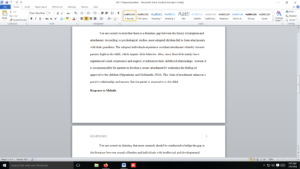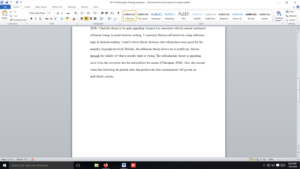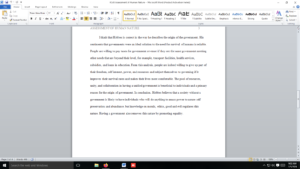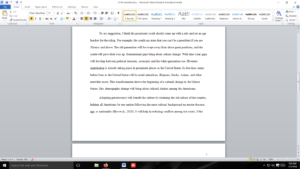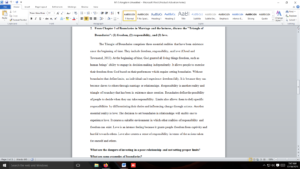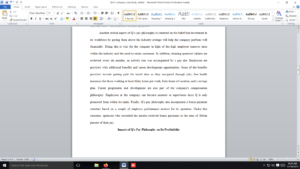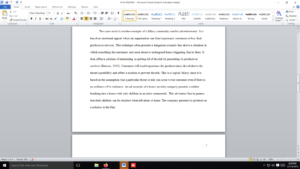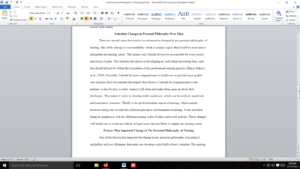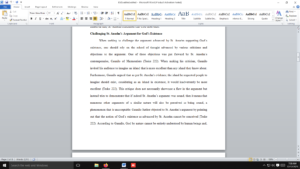Dito
Hero is a video and also Im pasting the transcript of the video
FEMALE SPEAKER: Cognition, of course, is a theory that was proposed by Jean Piaget. And he talked about how we make sense of our world. And we developed schemes.
One of the first stages of cognitive development is the Sensory motor stage. And if you break those two words up, you have senses and motor. And so we make sense of our world by moving through our environment and using our senses to develop those schemes. If we have limited motor development that means we’re limited in the space, in the environment, in the area that we can move through. And so that’s going to impact our cognitive development.
The second stage is the preoperational stage. The third stage is the concrete operational stage. And then the final stage is the formal operational stage. And you’ll notice when you look at Piaget’s theory, it begins at birth, his stages, and they end at adolescence.
So, basically what that says is that our sense of development when we talk about cognitive development, are pretty much is in place by the time we reach adolescence. And then what happens after that, as we grow into adulthood, is we simply build on those first four stages. The other thing about Piaget is that he said that those stages work in order. You have to go from one stage to the next stage, to the next stage.
So you can’t necessarily skip a stage. The other thing is that those stages have some variation in them. And so even though the first stage is from birth to two years, a child may move into the second stage maybe at 15 months or 18 months. But what he did say is that development ends, it’s done by the time we reach adolescence.
[MUSIC PLAYING]
When you think about information processing, think about a computer. You have your hard drive and you have the soft-drive. And so when researchers developed information processing, it’s just what it says. How we process information. We have our mental hardware and we have our mental software. We have the hardware, our brain, which is what we’re born with. It’s already pre-wired. But then what we do is we add information to that.
That enables us to do the things that we do. That enable us, for example, to go to school and learn how ABCs. That enable us to do a speech or that enables me to
Motor Development and Cognition
© 2016 Laureate Education, Inc. 1
sit here in front of you and to explain to you about human development. That was because of experiences that I’ve had. And so that adds to the hardware.
Now if the hardware is damaged, in other words, if there’s some brain delay, if there’s some damage to the brain, it may not work as we would like for it. So that means that the software that I use is going to have to be a little bit different because the hardware, the hard wiring, has been damaged to some extent.
Vygotsky is one of my favorite theorists. And the reason why I liked Vygotsky so much is because unlike the other theorists, he includes the sociocultural aspect. He includes the impact of culture on cognitive development. One of the things that Vygotsky talked about is that he said that learning takes place in collaboration with other people. That no man is an island unto himself. And that children learn better when they are teamed up with other children who have more skills than they do. And so he introduced the concept of scaffolding.
And so scaffolding is a teaching strategy that teachers can use to see where a child is and where they need to go. And so I can build on the information that you have, I don’t have to repeat the information that you already know. I can assess what you do know, and then build on that so that you can go further.
And so with Vygotsky, the interesting thing about him is that he looked at the individual as an interactive person in terms of their environment. That their environment has an impact on their cognitive ability. And when we team children up with other children, they tend to want to do as well as that other child that they have been teamed up with.
And who better to teach a child how to do something than another child. It’s not as intimidating. They want to learn a little bit more. And so Vygotsky left us with so much that we can draw upon to help us better understand cognitive development. Scaffolding is very, very effective. And it’s effective because it gives help where needed. Help that is needed as opposed to giving a child something to do. and they don’t need your help to do it. And so I’m going to praise you for what you do know, and then I’m going to introduce some concepts to help you expand the information that you already know.
And so a good teacher is paying attention to what their children in their classroom are doing and what they already know. And so then they say, Johnny I see you know how to count up to five. That’s great. And so I don’t need to repeat that. What I want Johnny to do is to count up to 10. And so, when we set the bar high I believe that children will meet that expectation. And scaffolding is one way to do that.
Answer preview
As per Piaget’s cognitive development stages, a three-year-old Mateo was at the preoperational phase of his intellectual development. At this stage, his thinking is anchored on intuition rather than logic, and that’s why he believed not only was his shadow following him around but also that every adult should know his name. However, by the time he was ten years old, Mateo had moved to the operational stage of cognitive development, evidenced by the concrete reasoning that allowed him to argue with friends without getting upset when they have differing points of view.
Vygotsky
Vygotsky argued that learning takes place due to the input of a knowledgeable adult guiding a child’s learning process. For example, Mateo was afraid of Santa Claus when he was three years old; however, such fear went away since, by the time he was eight years old, Mateo was no longer afraid of Santa Claus, considering he now enjoyed sitting on Santa’s lap.
[687 Words]
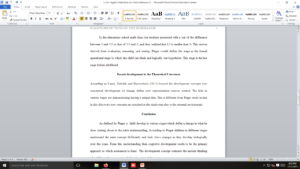
Cognitive development
